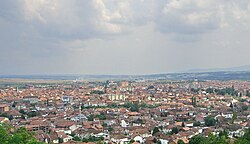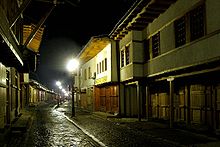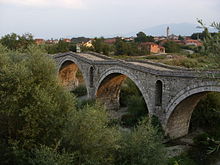| Revision as of 13:29, 7 December 2013 edit94.196.116.97 (talk)No edit summary← Previous edit | Revision as of 14:01, 7 December 2013 edit undoThomas.W (talk | contribs)Extended confirmed users, Page movers, New page reviewers, Pending changes reviewers, Rollbackers60,972 edits Reverted 3 edits by 94.196.116.97 (talk): Rv unsourced edit. The material has previously been removed for being original research. (TW)Next edit → | ||
| Line 3: | Line 3: | ||
| <!--See the Table at Infobox settlement for all fields and descriptions of usage--> | <!--See the Table at Infobox settlement for all fields and descriptions of usage--> | ||
| <!-- Basic info ----------------> | <!-- Basic info ----------------> | ||
| |name = |
|name = | ||
| |official_name = |
|official_name = Gjakovë | ||
| |settlement_type = Municipality and city | |settlement_type = Municipality and city | ||
| |mayor = PAL LEKAJ | |mayor = PAL LEKAJ | ||
| Line 95: | Line 95: | ||
| == Names == | == Names == | ||
| ] heritage.]] | ] heritage.]] | ||
| ⚫ | The name 'Đakovica' is Serbian, which can be easily distinguished by the ''-vica'' suffix, which means "little". The Albanian name for the town is ''Gjakova''. It is hard to tell which of the two names influenced the other. There are a number of theories concerning the name of the town: that it derives from the Serbian word ] (pupil) from earlier '']'';<ref name="amazon.com"></ref><ref>]: Градови у хришћанској и муслиманској епици, Belgrade, 2004 ISBN 86-7179-039-8</ref> or that it derives from the Albanian word for "blood" ('']'').<ref>Malcolm, Noel; Kosovo-A Short History, Harper Perennial, 1999, ISBN 978-0-06-097775-7</ref> Around 1594 or 1595, Hadum Suleiman Aga Hadum Efendia-built mosque{{vague|date=March 2013}}, which also bears the name of the donor-sponsors of the facility in town. Hadum Mosque, according to tradition, was built in property of Jakë Vula, a landlord with obviously an Albanian name and surname, hence the name would become the city – ''Jakovë''. Furthermore, it is also plausible to conclude that the initial town name, Jakovë, may in fact represent an Albanian way of pronouncing the otherwise south Slavic (Serbian) genitive case 'Jakova', as in "(zemlja) Jakova", meaning "(the land) of Jakov", as is the case with many other place names in ''Kosovo'', including the word ''Kosovë'' itself (the defintite article form being ''Kosova''). which might easily have been one word within a full name - ''polje kosova'' (the field of blackbirds). | ||
| The name ''Đakovica'' (Cyrillic: Ђаковица) is ] ({{IPA-sh|d͡ʑâkɔʋit͡sa|pron}}), distinguished by the ''-vica'' suffix, which means "little". ] names are ''Gjakova'' and ''Gjakovë''. The modern ] name is ''Yakova'' but during the ] (when Turkish was written in a modified ]), the name of the town in English was ''Jakova''.<ref>Paperspast: http://paperspast.natlib.govt.nz/cgi-bin/paperspast?a=d&d=EP19040409.2.56&l=mi&e=-------10--1----0--)</ref> | |||
| ==Etymology== | |||
| {{cite check|date=February 2013}} | |||
| ⚫ | It is hard to tell which of the names influenced the other. There are a number of theories concerning the name of the town: that it derives from the Serbian word ] (pupil) from earlier '']'';<ref name="amazon.com"></ref><ref>]: Градови у хришћанској и муслиманској епици, Belgrade, 2004 ISBN 86-7179-039-8</ref> |
||
| In the extensive Ottoman Empire list of the 1485, Yakova (the Turkish name) was mentioned as a village with 67 households and one rural priest. All personal names in this list are Serbian, except two who may have been of Albanian origin.{{Citation needed|date=February 2012}} | |||
| == Demographics == | == Demographics == | ||
Revision as of 14:01, 7 December 2013
This article is about city in Kosovo. For city in Croatia, see Đakovo. Municipality and city in District of Đakovica, Kosovo| Gjakovë | |
|---|---|
| Municipality and city | |
 | |
| Country | Kosovo |
| District | District of Đakovica |
| Government | |
| • Mayor | Mimoza Kusari-Lila |
| Area | |
| • Municipality and city | 586.91 km (226.61 sq mi) |
| Population | |
| • Municipality and city | 94,556 (municipality) |
| • Density | 160.5/km (416/sq mi) |
| • Metro | 408,270 City |
| Time zone | UTC+1 (CET) |
| • Summer (DST) | UTC+2 (CEST) |
| Postal code | 50000 |
| Area code | +381 390 |
| Car plates | 03 |
| Website | Municipality of Đakovica |
Đakovica or Gjakova (see names) is a city and municipality in western Kosovo. It is also the administrative centre of the homonymous district. The municipality's population in 2011 stood at 94,556. The city is located at 42°23′N 20°26′E / 42.39°N 20.43°E / 42.39; 20.43.
Names

The name 'Đakovica' is Serbian, which can be easily distinguished by the -vica suffix, which means "little". The Albanian name for the town is Gjakova. It is hard to tell which of the two names influenced the other. There are a number of theories concerning the name of the town: that it derives from the Serbian word đak (pupil) from earlier d(i)jak; or that it derives from the Albanian word for "blood" (gjak). Around 1594 or 1595, Hadum Suleiman Aga Hadum Efendia-built mosque, which also bears the name of the donor-sponsors of the facility in town. Hadum Mosque, according to tradition, was built in property of Jakë Vula, a landlord with obviously an Albanian name and surname, hence the name would become the city – Jakovë. Furthermore, it is also plausible to conclude that the initial town name, Jakovë, may in fact represent an Albanian way of pronouncing the otherwise south Slavic (Serbian) genitive case 'Jakova', as in "(zemlja) Jakova", meaning "(the land) of Jakov", as is the case with many other place names in Kosovo, including the word Kosovë itself (the defintite article form being Kosova). which might easily have been one word within a full name - polje kosova (the field of blackbirds).
Demographics
According to the 2011 census, resident population in Gjakova in 2011 was 94,556 of which urban 40,827 and rural 53,729 and male 47,226 and female 47,330. Of these, ethnicly Albanian were 87,672, Egyptian 5,117, Roma 738, Ashkali 613, Bosnian 73, Serb 17, Turk 16, Gorani 13 and others.
Of those that answered, Muslim were 77,299, Catholic 16,296, Christian Orthodox 22, Other 142, no religion 129.
History
Balkan Wars
Đakovica suffered greatly from the Serbian and Montenegrin armies during the First Balkan War. The New York Times reported in 1912, citing Austro-Hungarian sources, that people on the gallows hung on both sides of the road, and that the way to Đakovica became a "gallows alley." In the region of Đakovica, Montenegrin police-military formation Royal Gendarmerie Corps (Kraljevski žandarmerijski kor), known as krilaši, committed much abuse and violence against the non-Christian population.
Kosovo War

The town was badly affected by the Kosovo war, suffering great physical destruction and large-scale human losses and human rights abuses. Yugoslav units were stationed in and near the town in two barracks due to the risk of an attack by the Kosovo Liberation Army (KLA) from across the border in Albania. In one incident, NATO aircraft misidentified a convoy of Albanian refugees and attacked it.
Actions on the ground had a devastating effect on the town. According to the ICTY, OSCE, and international human rights organisations, about 75% of the population was expelled by Serbian police and paramilitaries as well as Yugoslav forces, while many civilians were killed in the process. Large areas of the town were destroyed, chiefly through arson and looting but also in the course of localised fighting between government security forces and members of the KLA. The actions of the government forces in Đakovica formed a major part of the United Nations war crimes indictment of the then-President Slobodan Milošević. In 2011, several dozen corpses were identified and returned to their families, though the number is relatively small compared to the figures of those who are still missing. As a result, any reference to the return of the former Kosovo Serb population remains highly sensitive.
Aftermath of Kosovo war
Most of the Albanian population returned following the end of the war. In 2001 free elections were held, with a majority won by LDK. Thousands of new stores were rebuilt. Qarshia e Madhe is a good example where hundreds of stores were destroyed during the war; in 2001 as many were rebuilt as they had been before the war. New television and radio media were launched such as Radio Gjakova, Radio Pandora, Radio Amadeus, and TV Syri. Local businesses set up manufacturing enterprises such as the IMN brick factory was one of these.
Geography and population

The municipality covers an area of 521 km, including the town of Đakovica and 84 villages. As of October 2007, the population is estimated to be of approximately 158,000 people, out of which 100,000 (60%) live in the town and 58,000 (40%) reside in the surrounding villages. The Kosovo Albanians constitute about 95% of the population ), while some 7060 Muslims by nationality, Roma, Ashkali and Egyptians making up ca. 4.7% represent the main minority communities.
According to OSCE estimations, before the Kosovo War of 1999 the municipality had a population of about 145,000, of which 93% were Kosovo Albanians and 7% non-majority communities, including some 3,000 Kosovo Serbs, who mostly lived in the main town.
Đakovica is situated at the Southern end of The Dinaric Alps and is approx. 100 km (62 mi) inland from the Adriatic Sea.
Sport
Apart from being a culture and educative center of Kosovo, Đakovica is also known as a sports center. The best example of this is the fact of having 38 clubs, which compete in all leagues over Kosovo. Đakovica's most successful team is KF Vëllaznimi which has won 9 titles of Kosovar Superliga, and 4 Kosovo Cups. "Shani Nushi" is the city's sports hall, which has a capacity of 3500 seats, while Đakovica's City Stadium has a capacity of 6000 (2000 seats).
International relations
See also: List of twin towns and sister cities in KosovoTwin towns – Sister cities
Đakovica is twinned with:
Notable people from Đakovica or descending from Đakovan families
- Mahmut Bakalli - 5th President of the League of Communists of Kosovo.
- Bardhyl Çaushi - Dean of law of the University of Pristina.
- Bajram Curri - A founding member of the Committee for the National Defence of Kosovo.
- Emin Duraku - Notable Yugoslav Partisan.
- Bekim Fehmiu - Actor. He was the first Eastern European actor to star in Hollywood during the Cold War.
- Fadil Hoxha - First Prime Minister of Socialist Kosovo.
- Atifete Jahjaga - President of Kosovo from 2011 onwards.
- Ardian Kozniku -Former Croatian footballer.
- Naim Kryeziu - Former footballer. Was part of the AS Roma team that won their first ever Serie A.
- Avni Mula - Famous Albanian singer, composer and musician.
- Fadil Nimani - Commander of the Kosovo Liberation Army.
- Dimitar Obshti - Bulgarian 19th century revolutionary.
- Ismet Peja - Singer.
- Aleksandar Tijanić - Serbian journalist and former national TV director.
- Sulejman Vokshi - A leader of the League of Prizren.
Gallery
-
 The clock tower
The clock tower
-
View of the clock tower
-
View of old stone building
-
Hotel
-
Monument
-
League of Prizren in Đakovica
-
 View of the city
View of the city
Notes and references
Notes:
References:
- ^ "Të dhënat demografike sipas komunave" (PDF). Statistics Agency of Kosovo. April 2013. Retrieved 5 October 2013.
- Book: Alexandru Madgearu, The Wars of the Balkan Peninsula: Their Medieval Origins
- Mirjana Detelić: Градови у хришћанској и муслиманској епици, Belgrade, 2004 ISBN 86-7179-039-8
- Malcolm, Noel; Kosovo-A Short History, Harper Perennial, 1999, ISBN 978-0-06-097775-7
- The New York Times, 31. december 1912.
- Krilaši, Istorijski leksikon Crne Gore, Daily Press, Podgorica, 2006.
- UNDER ORDERS: War Crimes in Kosovo – 6. Djakonica Municipality
- OSCE
- Documents Library – OSCE
- OSCE Template:PDF, October 2007. Retrieved on 9 March 2008.
- OSCE Template:PDF, November 2005. Retrieved on 13 November 2007.
- http://kk.rks-gov.net/gjakove/News/Binjakezohen-Gjakova-dhe-Lodeve-e-Frances.aspx
| Municipalities of Kosovo | ||
|---|---|---|
| District of Ferizaj |  | |
| District of Gjakova | ||
| District of Gjilan | ||
| District of Mitrovica | ||
| District of Peja | ||
| District of Pristina | ||
| District of Prizren | ||
Categories: